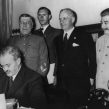
Russian Manipulation of History: “the Art of Interpretation”
Publication: Eurasia Daily Monitor Volume: 6 Issue: 161
By:

To mark the 70th anniversary of the signing of the Molotov-Ribbentrop Pact by Russia (USSR) and Nazi Germany on August 23, 1939, the Foreign Intelligence Service (Sluzba Vneshnei Rzvedki or SVR) published a book of declassified intelligence reports and documents to prove that "the Molotov-Ribbentrop Pact together with its secret protocol was a righteous and moral agreement that helped defeat the Nazis." On August 19 RIA Novosti news agency held a press conference in Moscow, which I witnessed, to launch the book that was put together by SVR Major-General (retired) Lev Sotskov. In Soviet times, the SVR was known as the First Main Directorate of the KGB (RIA Novosti, August 19).
The SVR book is specifically aimed at the three Baltic republics: Lithuania, Latvia and Estonia. The chief of the SVR press service Sergei Ivanov told the press, that the book (The Baltic in Geopolitics 1935-1945) "must be in each Russian school" – for the teachers to teach "true history." The publisher of the book, Oleg Vavilov, announced: "History is the art of interpretation." According to Ivanov, the collection of declassified intelligence reports that were mostly addressed to the Soviet leader Josef Stalin, was first put together by Sotskov as confidential material in order to teach SVR students in 2006. It was later put on the SVR website and published as a book to mark the Molotov-Ribbentrop anniversary (www.svr.gov.ru/material/pribaltica.htm).
Sotskov, who according to the book, served as a high-ranking KGB spy before retiring, told the press "history is being massively falsified, especially in Poland, Lithuania, Latvia and Estonia." In May, President Dmitry Medvedev signed an ukaz to create a "historic truth" commission to fight the "the falsifiers of history," who are attacking Russia and its heritage (EDM, May 21).
According to Sotskov, before signing the Molotov-Ribbentrop Pact in August 1939, Russia was trying to create a system of collective security in Europe with Britain, France, Poland, Lithuania, Latvia, Estonia, and other nations to stop Nazi Germany. Moscow’s main condition in 1939 was that its armed forces must be allowed to massively deploy in the Baltic territories and in Poland. But the Poles and the Baltic nations refused, while Paris and London hesitated to press them to accept Russian troops on their territory. If the Russian demand had been met, "our troops would have entered the Baltic territories much earlier," according to Sotskov, "but the Poles, the West and the Baltic countries wanted to collaborate with Nazi Germany instead." After the West refused to cooperate, the Kremlin accepted a German offer that gave Russia what it wanted: half of Poland, the Baltic countries, Finland and the part of Romania that is now Moldova – as a sphere of influence to occupy. After the Nazis attacked Russia in June 1941, Western democracies soon formed an "effective collective security system with Russia," which according to Sotskov is one of the main positive results of the Molotov-Ribbentrop Pact. The Pact also allowed Russia to rearm and to "move the border with Germany to the West" (www.svr.gov.ru/material/pribaltica.htm).
According to Sotskov, "it is a lie; the Baltic States were never occupied by Russia." The KGB intelligence reports that were sent to the Kremlin in 1940, say the Baltic people volunteered to join the Soviet Union. According to the KGB, communist rule was established through democratic elections, though elections were undemocratic, since many Russian-speakers did not vote. The denunciation of the Molotov-Ribbentrop Pact and the secret protocol that divided Europe by the People’s Congress in Moscow in 1989 under President Mikhail Gorbachev was a grave mistake, according to Sotskov, who is apparently fully supported by the SVR (www.svr.gov.ru/material/pribaltica.htm).
Many of the intelligence reports in the book were declassified to prove that Britain and the U.S., after they joined Russia to fight the Nazis, in fact accepted the results of the Molotov-Ribbentrop Pact: the Soviet incorporation of the Baltic countries, half of Poland, Moldova and part of Finland. Indeed, at Yalta in 1945 the leaders of Britain and America not only de facto accepted the Russian sphere of influence, as defined by Molotov-Ribbentrop, but also added to it a large part of Central Europe – which later became the Warsaw Pact.
Today Russian official support of the Molotov-Ribbentrop accord that divided Europe into spheres of influence is not just a difference over historical interpretation. Last year, during a visit to Germany, Medvedev announced that Moscow wants to call an all-European conference to create a new collective security system (RIA Novosti, June 5, 2008). After the invasion of Georgia in August 2008, Medvedev announced that Russia has a "sphere of privileged interests." Medvedev insisted that the war with Georgia had confirmed the need to form a new collective security system in Europe, since the existing ones (NATO, OSCE) did not manage to prevent the conflict (www.kremlin.ru, August 30, 2008).
Moscow, as in the past, is seeking an agreement with the West that would provide security and stability in Europe, if only Russia were granted a sphere of influence and domination. The exact boundaries’ are negotiable, if the West and first of all Washington, agree to the Russian interpretation of collective security. Of course, Molotov-Ribbentrop as well as the Yalta follow up must now be rehabilitated. During communist rule official propaganda fully supported Molotov-Ribbentrop as an agreement that was forced on Russia by the double-dealing West, while the Yalta system was secured by the OSCE. Of course, in Soviet times the Kremlin adamantly denied the existence of a secret Molotov-Ribbentrop protocol. Today, the protocol is also praised, since the Kremlin clearly wishes to re-enact it.




